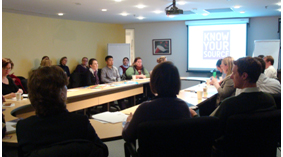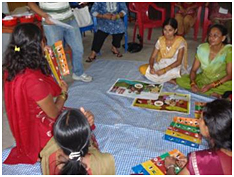Can You Hear Me Now? AED Hosts Social Marketing for Economic Development Roundtable Discussion
Social marketing applies proven promotional strategies and tools to focus on targeted consumer audiences with the express goal of changing or influencing specific social or economic behaviors. Similar to commercial marketing, social marketing begins by assessing the influencers and motivations of a targeted community with respect o the desired behaviors, and then creating a tool or strategy to systematically address those attitudes, perceptions or behavioral drivers. In economic development, this approach can have a significant impact on improving livelihoods and financial behaviors in a more sustainable way by applying an iterative approach that is not only market-driven but more specifically responsive to a community’s needs and behaviors.

On March 10, 2011, AED hosted an interactive roundtable discussion with panelists from Save the Children and AED’s Center for Environment, Energy and Economic Development who shared some of the innovative ways they have used social marketing principles to enhance economic development outcomes in their projects. In Nepal, FIELD-Support partner Save the Children has been working to develop and introduce micro health insurance through a decentralized community-managed scheme. Save the Children has applied proven social marketing tools to empower communities to set their own healthcare priorities, reduce the financial burden of health costs, and improve children’s access to better quality healthcare. The education and awareness campaign Save the Children launched—which was heavily driven by the community members themselves—included promotional posters, songs, street theater, door-to-door visits, and even a full-length Bollywood movie.
Focusing on the issues that face fisherman in Honduras and Nicaragua, AED’s Global FISH (G-FISH) Alliance, a five-year $4.2 million dollar USAID Cooperative Agreement, launched the “Know Your Source” campaign which aims to emphasize the importance of knowing where and how your food is sourced.

The morning’s first panelist was Ms. Ntongi McFadyen, Director of Integrated Financial Services and Urban Livelihoods at Save the Children, who shared an array of promotional tools developed under the “Developing Awareness and Education Tools for Micro Health Insurance in Nepal” strategic learning initiative (SLI) through the FIELD-Support LWA. Building on other global education concepts, Save the Children is field-testing a suite of micro health and insurance products among a test group of 15,000 families within two rural districts in Nepal. Key to Save the Children’s successful approach in Nepal has been its focus on engaging all community stakeholders in the marketing efforts, thereby increasing consumer awareness about insurance concepts and adapting the products and promotional materials to the local culture and customs, before the insurance product was introduced in the market. Ms. McFayden stressed that the participation of community representatives from conceptualization of the promotional materials through to product testing, roll-out and evaluation has helped establish a strong sense of local ownership. Save the Children plans to conduct post-roll-out evaluations to assess the impact of those efforts on the ultimate uptake of the insurance product. Following Ms. McFadyen’s presentation, guests viewed the trailer for a “Bollywood-style” feature film on microinsurance produced by SAVE.
Ms. Jennifer Barker, Deputy Director of the Global FISH (G-FISH) Alliance at AED’s Center for Energy, Environment, and Economic Development (CE3D), discussed the Alliance’s mission to promote sustainable fisheries practices through the application of the System-wide Collaborative Action for Livelihoods and the Environment (SCALE) approach, AED’s proven methodology for bring together “the whole system in the room” in order to initiate, implement and evaluate collaborative programs for large-scale impact. Through the Spiny Lobster Initiative (SLI), the Alliance is working to improve the livelihoods of coastal indigenous communities and change the way they fish for lobster.
To aid their efforts, AED launched the “Know Your Source” campaign with private-sector company Darden Inc. (owner of Red Lobster, Olive Garden, LongHorn Steakhouse, The Capital Grille, Bahama Breeze, and Seasons 52) as a key partner. Know Your Source aims to raise awareness amongst buyers and consumers about issues surrounding their lobster purchases. Coupled with research that consumers and businesses are interested in traceability and the source of their seafood, AED decided to use a marketing approach to support a social good. The project worked with the private sector to develop and test the message. Since its launch, the campaign’s website averages 500 unique visits a month, from a total of 53 countries.
This panel was part of FIELD-Support’s Roundtable Discussion Series, with contributions from Save the Children and the Global FISH Alliance under the new Center for Environment, Energy, and Economic Development.
The FIELD-Support (Financial Integration, Economic Leveraging, Broad-Based Dissemination and Support) LWA is an 8-year Cooperative Agreement awarded by USAID to AED and its consortium of 27 implementing partners to advance the state-of-the-practice in microenterprise development and microfinance and assist USAID Missions and other operating units design and implement innovative, integrated, market- based approaches to sustainable economic growth with poverty reduction. Find out more at www.marketlinks.org.

